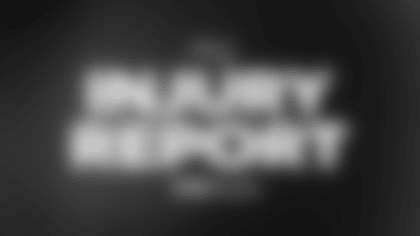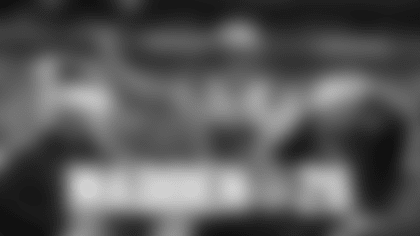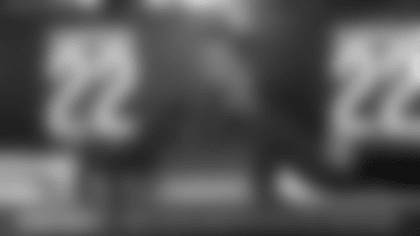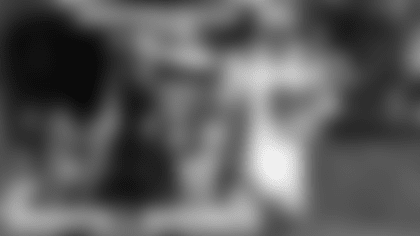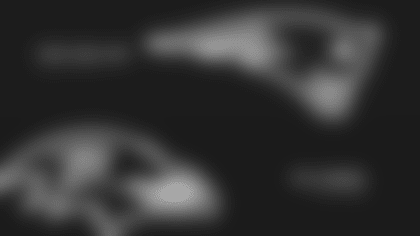BB: I would just say a couple of things on the Giants here to get started. Today is our day to start on red area stuff and the Giants are leading the lead in the NFC in the red area defense. They have had something like 17 field goals attempted against them. Which is a huge number. They are really playing well in that situation. We have all seen several of their games but even the Redskins game. The Redskins were driving right down there at the end and it looks like they had a chance to win it and had to settle for the field goal and get beat in overtime. They held the Rams to a couple of field goals when they got down there. Dallas, I don't know, what did they kick six or seven field goals in the game? They are doing a really good job there and that will be a big challenge for us this week to be able to get the ball in the endzone and defensively to stop them. They are very good in the red zone offensively with a big tight end like Jeremy Shockey, [Tiki] Barber can run it in, [Amani] Toomer, [Ike] Hilliard. They really have a lot of threats down there. So I think that will be key for us in the game and we will get started working on that today. Those guys are pretty good in that though.
**Q: Your red zone defense has been just okay? I remember last year at this time…
BB:** It was terrible. It is better than that [now]. It is not where we want it to be but it is better.
**Q: Is that attributed at all to the pass rush?
BB:** I think we are playing a little better down there. It is not where we want it to be but we are close. A couple of the scores that we have given up they are competitive, at least they are not waling into the endzone every time. Last year it was just terrible. A lot of guys were just standing in the endzone catching the ball and nobody was near them, not really even contesting the throw. The runners where going in standing up and that kind of thing. That just wasn't very good.
**Q: You have six rookies that are big contributors right now. Is this a bigger class that has ever contributed this early in your experience?
BB:** I think would probably be the most. My last couple of years there with the Giants when we had Myron Guyton and Greg Jackson, they were two rookie safeties that came in and started for us defensively which in those years hardly any rookies ever started or played. Those guys both started their rookie year, which was in 1989 I think. The 1986 draft in New York, the first six players were defensive players. It was [Eric] Dorsey, then Pepper [Johnson], Mark Collins, Erik Howard and John Washington and Greg Lasker. They were all drafted in the first three rounds but they didn't contribute as much the first year as they did in subsequent years where several of them went on to be All-Pro type players. But it wasn't the first year. That was a different era.
**Q: How do you know when they are ready to go out there? It seems like back then you had more time to figure it out.
BB:** I think it is a combination of both. Sometimes they are not and they are forced in. Sometimes that happens. They are not necessarily ready, that is just who is next and it is their turn. In other cases when you see enough plays in preseason, see enough plays on the practice field, you have the confidence to give them some playing time. Depending on how that goes, what I tell the players and how I feel about it is you earn your playing time. Nobody just gets playing time just because you are here. That doesn't mean anything. You have to show on the practice field that you are capable of going in the game and doing the things that you are being asked to do. If we feel reasonably good about that, then we will put you out on the field so that you can earn more playing time by playing well. That is really how it works. We can't just give playing time to anybody because if they don't do what they are supposed to do, somebody else could end up paying the price for is.
**Q: It seems like with Eugene Wilson and Asante Samuel you made that decision pretty early on. What made them standout?
BB:** It started in mini-camp. They started picking things up fairly well in mini-camp. We went to training camp and they did fairly well with their opportunities. In training camp, we had some guys banged up at that position. Ty [Law] wasn't practicing. Otis [Smith] wasn't practicing. Ben Kelly was out a little bit. We were missing some guys there and they were doing better than everybody else at that point, so that is why they got to play more than some of the other guys did.
**Q: In your history, when you make those decisions, 'Okay, I think this guys is ready to go,' are you usually right on or have you been more surprised pleasantly?
BB:** I think for the most part when you put players out there, if you have had enough of an opportunity to observe them, you usually have a pretty good idea of what they are going to do. Again, when Asante and Eugene started in the Giants game in the first preseason game, it wasn't like they had earned the job or anything. That was just an opportunity for them to play. They still had to go out there and prove that they were capable of playing. That is what preseason is for to look at people doing that especially against a team like the Giants that has real good skill players. I thought that was a good chance for them to go out there and see guys like Hilliard and Toomer and people like that and work against them. That is also part of the reason why we did it.
**Q: What about a guy like Dan Koppen who started out as a backup pretty much and then injuries kind of forced him in there? Have you been surprised pleasantly with him?
BB:** I think in Dan's case, he has worked almost exclusively at center this year and that is something that we talked about going into the season. We talk a lot about position flexibility and so forth, Dante [Scarnecchia], Charlie [Weis] and I talked a lot about that. Dante's recommendation and our agreement was the best thing for Dan would be to jut leave him at center and move somebody else as opposed to juggling him around and just try to keep him at one spot. That is kind of the way it worked out. We had to do shop shuffling at the guard spots and a little bit at center when Damien [Woody] missed a game there. A lot of the shuffling has been at guard spots and the move has just been to keep Dan at center and then to move somebody else into those guard positions. That is kind of how that worked out. I think in his particular case it was probably better for his development to just stay there at that one spot so that he could always be working from the same communication, the same calls, the same blocking angles and all of that stuff. Not that we don't ask other people to do it but just given his situation we thought that was the best thing to do, to leave him there and move other guys whereas guys like Samuel and Wilson on the defensive side of the ball, [Dan] Klecko obviously we just thought it was better given their circumstances to have some more position flexibility than what they had at the start of camp. Each decision like that has got to be a little bit of an individual one.
**Q: You have been very candid about these guys and talking about hitting the rookie wall. With this many guys that are using and playing right now, how do you manage that as they approach the point in the season that they have never gotten to? Is that something that you have in the back of your mind?
BB:** Sure. You bet. Every rookie is going to hit it. Everybody is going to have to go through it and deal with it. I don' think that anybody is saying, and I am certainly not saying that it isn't something that a player can't handle. It is just a new hurdle for them. It is just something that they haven't done before and they are going to have to work their way through it. We all had to do it. Not that I have played but just as a coach in the first year in the league you have to do that. It is a long season. I talked to them a little bit about pacing themselves. I don't think we are at that point yet. It is not that far away, you are right. It is something that we are going to have to stay on top of. One of the biggest things is, aside from everything else, if you can just stay fresh physically, get your rest, get your nutrition, stay away from colds and the flu symptoms and that kind of stuff that goes around, that drags you down a lot of times when the seasons change you get worn down a little bit. If you can eliminate that kind of stuff and take care of that stuff and get treatment as soon as something is coming up so it doesn't become a nagging thing and really start to get worse as the season goes along but can just get better in a few days. A few things like that can really help you keep going more than if those things start to snag.
**Q: Have you drastically changed your weekly practice schedules since you have had this rash of injuries? Just in terms of going out there in pads.
BB:** We haven't been out in pads in I think three weeks.
**Q: Have you done that in your recent memory as a coach?
BB:** No. Maybe our Thanksgiving game or something like that but we usually go out in pads at least twice. I would say it is rare that we don't go out in pads at all during the week. But we haven't been out in pads in a while.
**Q: Do you feel that guys are crisp because of that? What sign would you look for where you would say, 'Put them back on?'
BB:** I just think it is the player's performance relative to what the standard is. A guy comes in and he is improving and he is working hard and he is continuing to gain ground and then at some point that starts to level off and go the other way, whether that is here or whether it is here, each player has different ability levels. Once it starts to level off and start to head the other way, then we need to find out what the problem is.
**Q: How did you develop your 'use of pads' philosophy?
BB:** I have done it both ways and I have been a part of both practicing with them and without them. There are advantages to both. There are a lot of different ways to skin a cat and coach in this league, a lot of different systems, a lot of different styles and all of that. I just think that is what is what works best for us. But, we are in a situation right now where I think it will be more counter-productive than productive. I will say that I think the players have approached it with a good attitude. The tempo of the practices are probably a little bit higher. That is the positive. We are not getting the technique work and the contact that we would get if we were in pads. But from a timing and speed standpoint it is probably a little bit better. They don't seem to mind it.
**Q: It is interesting, it would seem that when you say they level off, they would need some more teaching and you would put the pads back on them.
BB:** No, I wasn't saying put pads on them. I was saying that when a rookie starts to not to continue to improve even though he is out there practicing every day and he is in the meetings and everything. He is in the meetings and he is doing everything everyday, but now there is no improvement then that doesn't really add up. Then that means that he is either not working hard or it is kind of going in one ear and out the other or he has hit the proverbial wall and that needs to be addressed. Normally, when a guy comes in, he is there every day, he works hard, he practices and you see improvement over a period of time. When all of that is happening and you don't see it then I think you have to say why.
**Q: I jumbled my question a little bit. What I was wondering was will there be a point at which you decide you will put the pads back on because you are not seeing something I would like to see?
BB:** I don't know. What I try to do is evaluate the team week-to-week and do what I think the team needs and what is best for the team for that particular week given whatever the challenges are that we are facing, the opponent, the whole situation, our state of the team, mental, physical and otherwise, and try to do what is best for it. Sometimes it is a combination of things. Sometimes it is one or the other. I think it depends on what you feel like your team needs.
**Q: If you saw people missing tackles would that be one of the flags that you would say, 'put them back on?'
BB:** Well, that is a tough one because even when we are in pads, we don't tackle live. We don't do much live tackling. We take care of that in training camp and that is when we work on it because a guy is getting a lot of hitting during the games and then you come in there and ad that into it during the week, I think you could be asking for trouble there. We have done some tackling during the regular season but not really very much. I have been on a lot of teams where the head coaches have absolutely forbidden any type of tackling during the season or training camp for that matter. That is a tough one. Obviously, if it gets bad enough and that is the only way you can correct it then you probably want to do it. I don't think, given the wear and tear that an NFL season takes on a player, I think that you are probably asking for a chance of possibly another injury in a situation like that.
**Q: Is tackling in the secondary, obviously it is important, but especially this week with a guy like Shockey?
BB:** Absolutely. Shockey, Barber, Toomer, Hilliard, all of them. They are all very good after the catch and they have different running styles, very different. You can't play defense if you can't tackle. You maybe can play corner and cover guys and if they never catch the ball it doesn't show up much. But sooner or later, it is going to show up. You just can't be a defensive player and not be a good tackler and be a good defensive player. It is almost impossible. The only way to do it is to shut the guy down that you are covering and never let him get the ball so it never comes up. Otherwise, you are going to have to make tackles. If you don't make them you are just going to give up so much yardage in the secondary that your team is going to pay a price. I think a player would really have to do a lot to overcome that. That being said, some guys tackle better than others and everybody is going to have missed tackles. I have never coached a defensive player that didn't have any missed tackles. But when you start having a lot of them, it doesn't really make any difference what defense you are in, what you call, what the situation is, it is nothing good. If you can't get the guy down with the ball then you don't have anything.
**Q: How would you grade the tackling to this point?
BB:** I think what I said yesterday would apply to every phase of our game, consistency. There are times when I think we have tackled well. We have really been fundamentally good and made some really good plays. There are other plays that we missed that I think were a lot easier than some of the ones that we made that were a lot harder so therefore I think we should have been able to make those. I think that is part of the consistency just like probably every other phase of our game you could bring up.
**Q: Rodney Harrison is a big hitter who likes to leave his feet and drop his shoulder. Do you have to balance that with him not wanting him to go for the kill shot?
BB:** I think that is a judgment that a player has to make. I think Rodney does a good job of it. I think one of Rodney's strengths is his tackling ability. That judgment that the player has to make, the number one thing is to get the guy down. Now, sometimes if you can get him down with a big hit, that is great and that can be a big momentum lay for your team, not just the guys on defense, but also the other teammates that are seeing it on the sideline. It could be something that could really send a spark and I think you have to pick your spots on that. You get a guy in the open field who is a quick shifty guy and you try to make the big hit on him and there is probably 90 percent chance that you are going to miss and you just end up giving up more yardage because you can't get him down and that is not the time to do it. But there are certain times in the game, certain situations where I think that opportunity can be presented for a player and we really want him to take advantage of that. It is the same thing in terms of causing turnovers. A lot of times you get out in the open field, you can't really be thinking about turning the ball over, you just better be thinking about getting the guy down who has got it. In other situations where the guy has got the ball and maybe somebody else has him stood up and you can come in and punch the ball out or make a big hit, then that is a different story. You coach those things. You show examples of them. Each situation is a little bit different. The player just ahs to use his judgment at that point and time. Like Tyrone [Poole] in the Washington game. I am not talking about tackling. I am talking about turnovers. He has a chance to make the tackle or he has a chance to punch the ball out. He felt like he could get it out and made a good judgment on that and did get it out. Other times, sometimes go to make the turnover and miss the tackle and they look bad on it. A lot of it is judgment. Fundamentally we try to teach it. Each situation is a little bit different. The guy has got to make his own decision out there.
**Q: How would you assess your safety play overall compared to last year?
BB:** I don't know. We've played five games. I think we will wait more returns come in. I would say overall the safety play has been just what I said about the rest of the team. It has been good at times. It can be more consistent. I think overall defensively, we are a better team than we were last year but we have only played a third of the season so that doesn't really mean anything.
**Q: Is that mostly because looking back at last season for a minute, around this time, I remember that you had to start over. You had to go back to winning one-on-one battles and the tone of your practice was a lot different than it is now. Did the players get the messages in the offseason, in training camp, winning the one-on-one battles?
BB:** I think it has been a long process. Schematically we have gone back to doing some things fundamentally, simpler with less scheme. We have made some adjustments in our techniques. Made some personnel adjustments. Just tried to put things together a little bit different and maybe start it from a little different point in training camp than when we started from the year before. Overall I just think we are better than we were last year but we still have a long way to go, I am not saying we are any good, I just think that we have made some improvement there.
**Q: With a guy like Koppen what goes into your decision when you say, 'Let's leave him at center,' when you have these three guys on defense and you say, 'We are going to make sure that they have position flexibility?'
BB:** Well I think that is a real good question. I would say that particularly on the offensive line, but it does extend to all of the positions, you try to do what is best for your team. Sometimes what is best for your team isn't necessarily what is best for each individual person. But somewhere along the line, somebody has got to make some sacrifices. If you have a situation where you say, 'Okay, the best thing for this player would be to leave him right here, but for the good of the team, he really needs to be able to play two spots because it is going to be harder for us to move somebody else.' Then you have to ask that guy to move. You have to do that for the team. If he has a good team attitude the player will do that too. That is what having a team is. The decision making comes into what you are going to ask the player to do and how well you think he will do his one thing relative to how well somebody else might do two things and you just try to have what you believe is your highest performance level, given all of that scenario.
**Q: Is it different for a rookie though? Like if Koppen had been a third year player, would it have been a different decision?
BB:** It might have been. It not only depends on Koopen, but it depends in some cases on the other people around him not what is just best for him. Again, I can't go into a game or a season, and say, 'Okay, I am going to do what is best for Koppen, what is best for Woody, what is best for [Mike] Compton, what is best for [Joe] Andruzzi, what is best for [Russ] Hochstein.' It is impossible. You just have to take everything you have to work with there, know all you know about everybody and all you know about what you think your needs are going to be knowing all you know about how the team is going to fit together the way you think it is going to go, of course it never works out exactly that way and make your decisions based on that. Then you adjust them and modify them as you go along. Again, I think that Dante is a guy that I rely heavily on. He has got a lot of experience. He knows those players better than I know them. He is in there with them 24 hours a day. He sleeps with them. He knows their mentality and how hard it would be for one guy to adjust versus another to adjust. We've talked about that before. Some guys if you flip them from one spot to another, it is no big deal. Other guys, it is like starting all over again.
**Q: Is it a developmental issue? Do you think that Dan should learn how to play center at this level and do you say, 'We can't bother him with playing guard right now. Maybe after a couple of years after he has got this mastered, we can move him over there?'
BB:** Maybe. And maybe if you think he will be a good guard, maybe that is worth doing. But if you really think that his position is center, it is not guard, it is center, that is really his position, and he will be pretty good at that if you just leave him at that spot, then you just leave him there. If you think that, 'Well, he will be able to do multiple jobs and it will all be about the same,' then he is a good guy to use the flexibility with. Some guys when you put a ball in their hand, I know offensive line sounds like offensive line but some guys when you put a ball in their hand, it is a whole different world. Sometimes better, sometimes worse. But it is a whole different world and it affects a lot of things that they do. Some guys when they move from guard to center, the fuse blows. They just can't get it. Other guys, they are more natural doing that. Whether it be the shotgun snap, whether it be snapping the ball and moving hard to left or to your right to make a block but still executing the snap, not having the ball on the ground and all of that stuff, some guys don't have a problem with that. Other players do. So it is not as easy to just move them as what you think it would be because each player is a little bit different and his skills are a little bit different and sometimes his mentality is a little bit different.
**Q: Just talking about the snap, Koppen doesn't seem like he has got a very tight spiral a lot of the time. It seems like it floats back there. Is that a Boston College thing? [Laughter]
BB:** [Laughter] No. The most important thing on the shotgun snap is accuracy. Like when you watch option teams play, when they pitch the ball, the quarterbacks don't pitch it in a tight spiral they kind of float it there. It is easier for a back to catch the ball when it is tumbling a little bit, when it is floating than sometimes when it is spiraling. Obviously, you can't throw it down the field like that but for short areas, that is not a hard ball to handle. It is not about velocity it is about accuracy. The worse thing about a shotgun snap for a quarterback is not knowing where the ball is going to be, not that you don't have to look at the ball come into your hands, but there is a point where that snap comes where you have to get your eyes down the field. You catch it and you get your arms down the field. On one play the ball is at your feet, the next play it is over your head then it is over here, it is over there, you are trying to be a shortstop and by the time you come up with the ball and look at the coverage, you can't find where anybody is. The most confident thing for a quarterback is for the ball to right here on his throwing side, around chest high so he can handle it cleanly and then do what he has to do. It doesn't matter how quickly it gets back here, he is not going anywhere anyway. Another twentieth of a second, whatever the difference in velocity is, it doesn't really make any difference. It is much more of a factor in the kicking game where that one or two hundredths of a second makes a difference in a blocked kick. But that is not really the issue on a shotgun snap. Accuracy is the number one thing.
**Q: Is it ever a bad thing for the rookies to get thrown in too early? Can that be detrimental to his development?
BB:** I think if he is not ready and he gets thrown in he can lose his confidence. Then if he loses his confidence, then it is hard to get that back.
**Q: Is that tough to gauge?
BB:** I think you have to be aware of it. I mean look, you go out there and it is your first game and you drop a couple of passes and have the players kind of give you that look when you come to the sideline and the coaches and to have all the fans boo when you come off the field and then go back out there the next time. That can affect some people. You have to play through. Some guys, it doesn't affect them. A guy that is just starting out at a position like that, defensive back or a receiver or something like that where a guy is really in the spotlight, the quarterback, a few bad plays, a few negative reactions and all of a sudden, he never had that happen to him before that can definitely…everybody goes into slumps from time-to-time in every sport. You miss shots, you don't hit the ball well, you drop passes or whatever it is, you have to play through that. But a lot of times when it happens early and then you lose your confidence, it takes a lot to get that back. If you don't have a lot of opportunities like sometimes rookies don't, you go in there early in the season, have a few bad plays, and it becomes a while before you go back in there and now it has been a month or two and all of a sudden everybody else is questioning it and even sometimes the player starts questioning, 'Can I still do this or can I do it at this level?' Or a punter or a kicker, we have seen that happen a lot.
**Q: Is that last hurdle that a rookie might face generally mental or is it more physical?
BB:** It depends on the player. Some players I think it is definitely physical. Say a player like tom Ashworth, not that he is a rookie, but when he came to us he played tight end in college, he has got a great frame but didn't have really the bulk and strength that he needed to play the position. Once he gained that, his performance got a lot better. It wasn't that he wasn't tough. It wasn't that he wasn't a good athlete. It wasn't that he didn't know what to do. All of that stuff came pretty quickly. Physically he needed a little bit more development on the offensive line. That is not uncommon for that position. It is not uncommon for a player who is 21 years old to not have the same strength that he is going to have at 25 or 26 and to play against people who have that same physical maturity that are four, five, or six years ahead of him, not everybody has it a 21. Some guys get it three or four years later. That can be true on defense too in terms of being physical and tackling and having a physical side to your game that can significantly improve. A lot of guys come into this league and that is not the problem. It is not about how much they bench press or how much they weigh or how much they squat. They can do plenty of that. Then it becomes more of a fundamental and technique thing.
**Q: In your experience, is there more of a mental learning curve than physical typically?
BB:** Yes. Absolutely. I think the mental part is by far the hardest, yes. I am not saying that there isn't physical development because I think there is. But compared to the mental, I think the mental is much greater.
**Q: Where is Bethel Johnson in terms of his development? Is he learning more than on wide receiver position?
BB:** Where is he is terms of his development? Well, I think he is ahead of where he was five weeks ago when the season started. I think that because of the situation that we have had at receiver, he has been forced to learn multiple positions and I think that is something that he hasn't had a lot of experience with. I think that has started to become, I don't want to say comfortable because I don't know if you ever get comfortable with it, but I think he is getting more comfortable with it than he was a few weeks ago.
**Q: Can his ability as a kick returner help his confidence as a receiver?
BB:** No doubt about it. I don't think there is any doubt about it. Just the ability to go out on a football field in the NFL and make plays doing anything is good. Everybody is looking for somebody that can make plays in any phase of the game. Sure. I have seen it go the other way too. Guys not make plays in one phase of the game sometimes affects their confidence or their performance in another. You wouldn't think it necessarily would and it doesn't always, but sometimes that happens. A guy goes in and drops a couple of punts and he drops a couple of passes and pretty soon he is starting to question his confidence a little bit.
**Q: How well has Dan Koppen played in your assessment in relation to other centers around the league?
BB:** I think overall, you would have to say his play has been above average for a rookie center. Just the fact that he has gone in there and played and the wheels haven't come off and it hasn't been a disaster, certainly some plays are better than others. I think that Dan has gotten better since he has been playing. I think he has improved a little bit each game some of the things that were a problem back in September aren't as much of a problem now. That is good. I think you have to say it is above average just the fact that he has gone in and done it this quickly. There are still plenty of things he can improve in. I don't want to sit here and say it has been great because it hasn't great. But given the circumstances and all I think he has done a decent job.
**Q: Has he exceeded what you thought he would do?
BB:** I think that he is playing about like we thought he would play. That being said, had everything gone the way it might have gone, he would be playing behind Woody. Which there is no disgrace in that. But the way it has gone, he has gotten an opportunity to play and I think that he has played about the way Scott [Pioli], Dante and I thought that he would play when we saw him at BC and he was pretty solid. It wasn't a first round pick [performance] or anything, but he played pretty solidly and he is doing about that same thing at this level. He is strong. He doesn't get pushed around on the line. He is consistent, in relative terms. He could be better. But he is relatively consistent. He doesn't have a lot of just terrible plays, holding penalties every play or snapping the ball over the quarterback's head, all of that stuff. So you eliminate a lot of those real bad plays and then play with some toughness and play with some strength on the line, you can survive with that. Offensive linemen, they can play a long time playing like that.
**Q: Did he and Klecko have some battles? Did you see that tape? Did you see them go at it?
BB:** Yeah, they did.
**Q: What was that like? What did you see?
BB:** Klecko, was I thought, from the tapes that I saw last year, I thought that Klecko was the most productive college defensive player that I saw. Productive.
**Q: Any college defensive player or defensive lineman? Any position on defense?
BB:** I would put him up there with anybody. He was productive against everybody. Take out any tape that you want, Miami, Virginia Tech, Syracuse, BC, you can go right down the line, West Virginia. I must have seen him play seven or eight games.
**Q: So he ate Koppen alive? [Laughter]
BB:** No, I didn't say that. I said that he was very productive. Yeah, he got blocked. He didn't make every tackle, but he made a lot of them. He was a pain in the neck.


